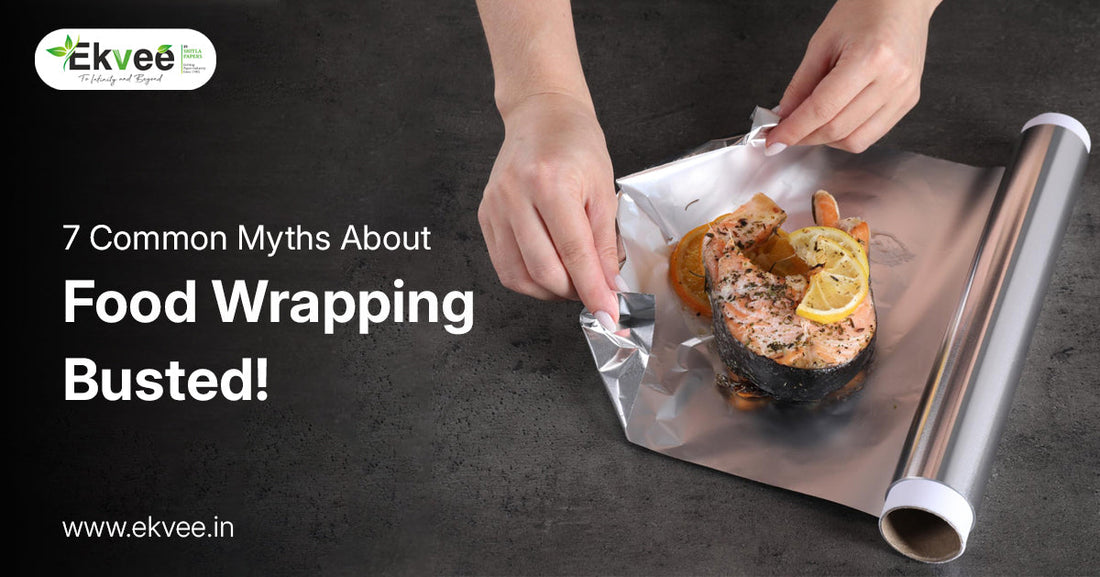
7 Common Myths About Food Wrapping – Busted!
Share
When it comes to wrapping food, many of us rely on habits passed down through generations — from using aluminum foil for leftovers to tightly wrapping vegetables in cling film. But how many of these practices are actually good for your health, your food, and the planet? Let’s bust some of the most common food wrapping myths and set the record straight.
Myth: Foil Keeps Food Fresh the Longest

Fact: While aluminum foil may seem like a go-to for keeping food warm, it’s not ideal for preserving freshness. In fact, foil can react with acidic or salty foods, leading to a metallic taste and even leaching harmful substances. Paper foodwrap allows the food to breathe, helping maintain its natural moisture without the chemical risk. It’s a Safe & Hygienic Food Wrap option for your everyday needs.
📝 Read this blog to discover 5 Healthy Ways to Store Food Without Plastic Wrap
Myth: Plastic Wrap Is the Only Leak-Proof Option

Fact: With advancements in food-grade materials, paper foodwrap today — like those from Ekvee — are Greaseproof Food Paper that is leak-proof and ideal for wrapping oily, moist, or even hot food items. They do the job without suffocating your food in plastic.
Use eco-friendly paper bags instead. Learn more in Eco-Friendly Paper Packaging | Why It’s the Future of Sustainability
Myth: Paper Foodwrap Tears Easily

Fact: Not all paper foodwraps are made equal. Ekvee’s Non-Stick Wrapping Paper is specially crafted to be strong, tear-resistant, and capable of withstanding handling during deliveries or takeaway. They're durable enough to hold your sandwiches, wraps, snacks — you name it!
Myth: Plastic Is Cheaper and More Convenient

Fact: Plastic may seem cost-effective in the short term, but it contributes to environmental damage, health risks, and waste management issues. Eco-friendly foodwraps, when purchased in bulk as a Food Wrapping Roll, offer value — plus they enhance your brand image and reduce your carbon footprint through Sustainable Food Packaging.
Myth: Foil Is Safe for All Types of Food

Fact: Foil should never be used with acidic items like tomatoes, vinegar-based sauces, or citrus foods, as it can leach aluminum into your meals. This could potentially pose health risks over time. Paper foodwrap is neutral, Safe & Hygienic, and certified for direct contact with food.
Myth: Paper Foodwrap Doesn’t Work for Storing Vegetables

Fact: In reality, wrapping vegetables in breathable paper foodwrap can actually extend their shelf life by preventing moisture buildup and mold. For example, coriander leaves last longer when wrapped in paper and placed in an airtight container.
Want to know how? Read our blog on How to Store Coriander Leaves for Longer Duration
Myth: Eco-Friendly Wraps Are Hard to Find

Fact: That might have been true once, but today, sustainable alternatives are easily available. Brands like Ekvee Foodwrap offer a wide range of Eco-Friendly Food Wrap options that are food-safe, greaseproof, and aesthetically pleasing for everyday use at home or in your food business.
Conclusion
Our food habits are evolving — and it’s time our packaging habits do too. Ditching plastic and foil doesn’t mean compromising on freshness or functionality. It means making a conscious shift toward healthier, safer, and more Sustainable Food Packaging choices.
Ready to make the switch? Explore our range of Food Wrapping Rolls and Eco-Friendly Food Wraps at Ekvee Foodwrap and wrap your food — and values — the right way.
